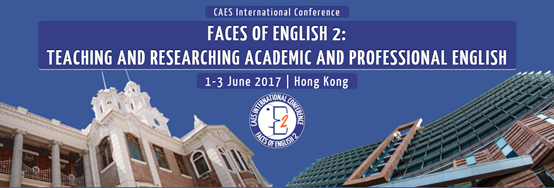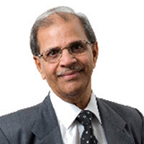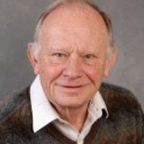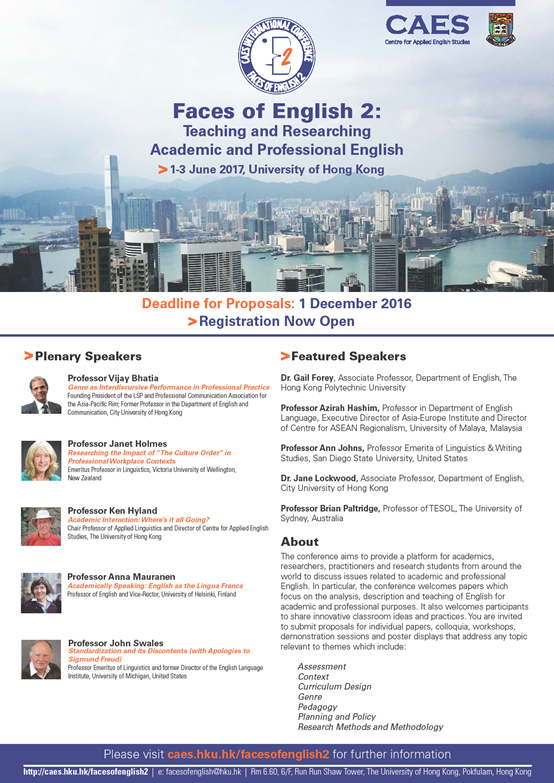会讯 | “学术及专门用途英语教学与研究”国际会议 (二号通知)
2016/10/16
Teaching and Researching Academic and Professional English

香港大学应用英语研究中心将于2017年6月初(1日至3日)举办“学术及专门用途英语教学与研究”国际会议,此次会议级别高、规模大、专业性强,届时Ken Hyland、John Swales、Anna Mauranen、Janet Holmes、Vijay Bhatia、Ann Johns、Brian Paltridge等EAP和ESP领域国际著名应用语言学家将进行主旨及特约发言,以及会后由John Swales、Vijay Bhatia、Ann Johns和Janet Holmes将亲讲授的四场研修工作坊。
会议议题包括:Assessment、Context、Curriculum Design、Genre、Pedagogy、Planning and Policy、Research Methods and Methodology。
参会活动包括:论文报告(Paper presentation)、工作坊(Workshop)、论坛(Colloquium)、教学展示(Demonstration session)以及海报展示(Poster display)。
主旨发言人:
Professor Vijay Bhatia

发言主题:
Genre as Interdiscursive Performance in Professional Practice
Discourse and Genre Analysis has played a key role in the conceptualisation, development, and recognition of professional discourse as an important field of inquiry in applied linguistics. In doing so, it has also been instrumental in widening the scope of applied linguistics to include areas such as organizational, management and corporate practices, translation and interpretation, and even information and visual designing within its purview. In more recent research, genre has gone beyond its primary concern to analyze and understand discursive practices in various academic and professional contexts to integrate discursive and professional practices in order to account for interdiscursive performance in specific contexts. Drawing on some of the key aspects of critical genre theory to account for interdiscursive performance in professional communication, I would like to suggest that it is perhaps one of the best resources available for the demystification of institutional, organizational and corporate practices.
Professor Janet Holmes

发言主题:
Researching the Impact of “The Culture Order” in Professional Workplace Contexts
Building on our theoretical model developed to analyse workplace discourse in its wider socio-cultural context (Holmes, Marra and Vine 2011), this presentation discusses and illustrates the concept of the “culture order” (Holmes 2016). Drawing on data collected by the Wellington Language in the Workplace Project (LWP) team, I will demonstrate ways in which the culture order impacts on workplace interaction. The examples include intercultural interactions between New Zealanders and Chinese migrants in white collar workplaces, between New Zealanders from different ethnic backgrounds, and between new and experienced workers in professional contexts. The presentation will also illustrate how teaching and learning resources based on the LWP team’s research have been developed to assist new migrants as they enter the New Zealand workforce.
Professor Ken Hyland

发言主题:
Academic Interaction: Where’s it all Going?
The view of academic writing as an objective and faceless kind of discourse has been replaced by a new orthodoxy of interactivity in recent years. We now see writers as taking a stance to convey their attitudes, personality and credibility and seeking to engage readers by explicitly bringing them into the discourse. But while the relentless search for rhetorical evidence of these features in a range of different languages, disciplines and genres has become something of a cottage industry, it is uncertain whether interaction in writing is a new development or whether growing applied linguistic interest just makes it seem so. In this presentation I explore how interaction has changed in recent years, asking whether academic texts are becoming more interactional and if so in what ways and in what fields. Based on a corpus of 2.2 million words from the same leading journals in four disciplines from the humanities, social sciences and physical sciences at three periods over the past 50 years, I explore changes in the use of stance and engagement. The surprising results seem to suggest changes in rhetorical conventions which accommodate more explicit interpersonal interactions in the sciences and more detached practices in the soft fields.
Professor Anna Mauranen

发言主题:
Academically Speaking: English as the Lingua Franca
Academia is in the midst of major upheavals: in a globalized world, competition for research funding, jobs, good students, and positions in international league tables is getting tougher – and while all this is going on, linguistic landscapes are being turned about. Students, teachers, and researchers have become highly mobile, making their careers in different locations. English has become the unquestionable global lingua franca. At the same time, most scientists and scholars today find themselves in multilingual environments, where people move skillfully between languages, even if English is the most widely shared resource. How do we understand successful academic English in a world where the majority of its users speak it as an additional language? This paper looks into changing position and shape of English as a lingua Franca (ELF) in the academic world. ELF is a complex form of language contact, which is viewed from three key perspectives: the cognitive, the micro-social /interactional, and the macro-social. The talk draws on spoken and written academic ELF corpora, compiled at the University of Helsinki: the spoken ELFA corpus and the written WrELFA corpus. It is argued that academics make good use of their varying repertoires of English in co-constructing meanings and academic knowledge.
Professor John Swales

发言主题:
Standardization and its Discontents (with Apologies to Sigmund Freud)
I will first attempt to offer some thoughts about the trends and emerging themes in English for Academic Purposes. This will be followed by a hopefully mildly entertaining series of vignettes illustrating the vagaries and oddities of the academic world, mostly drawn from our own universe of academic discourse. These unusual pieces of academic prose thus deal with the inventive and the extraordinary, and they include imaginary authors, confessionals, egregious reviews, strange contracts, dangerous teaching materials, unhappy titles, narratives and fantasies. In closing, and more seriously, I will assess the opportunity cost of standardization in academic and scientific journals; in particular, its consequences for publishing internationally, and for those of us who assist others attempting to do so.
特约发言人:
Dr. Gail Forey (The Hong Kong Polytechnic University)
发言题目:
The Value of Meaning-focused Metalanguage for Teaching and Learning
Professor Azirah Hashim (University of Malaya)
发言题目:
Adversarial and Arbitrative Discourses
Professor Ann Johns (San Diego State University)
发言题目:
Grappling with Self-Promotion in the Personal Statement: Two Case Studies
Dr. Jane Lockwood (City University of Hong Kong)
发言题目:
The Many Faces of Workplace English: Research and Development in the Teaching of Business English
Professor Brian Paltridge (The University of Sydney)
发言题目:
Ethnographic Perspectives on English for Academic Purposes Research
会后研修工作坊
(1) Criticality in Genre-based Professional Communication Programmes
主讲人:Professor Vijay Bhatia (City University of Hong Kong)
Discourse and Genre Analysis has played an important role in the planning, development of teaching materials for Professional Communication programmes in English. In the light of the some of the key research findings from current engagement with Critical Genre Theory, I would like to illustrate and argue for a reconceptualization of some of the key aspects of the planning, designing, teaching and assessment of English for Professional Communication programmes.
(2) Recording and Analysing Workplace Interaction to Assist ESL Learners
主讲人:Professor Janet Holmes (Victoria University of Wellington)
This workshop will illustrate the distinctive characteristics of the methodology developed by the Wellington Language in the Workplace Project team. Following a brief outline of our theoretical model, we will discuss the practical steps involved in collecting good quality workplace talk, and then analyse some data using the analytical approaches we have found useful. Some applications in the workplace and the classroom will be evaluated.
(3) Using the Michigan Corpus of Upper-level Student Papers (MICUSP) as an EAP Resource
主讲人:Professor John Swales (University of Michigan)
MICUSP is a freely-available electronic collection of over 800 students’ “A” papers from 16 disciplines (covering humanities, social sciences, natural sciences and engineering). The website includes easy-to-use “search” and “browse” functions. The central issue that the workshop will address is how MICUSP might be used by students and instructors as a vehicle for revealing disciplinary and genre conventions and expectations. After a brief demonstration of how three MICUSP projects were carried out, participants will undertake in groups a series of tasks. These involve linguistic and rhetorical consciousness-raising, tracing the function of key phrases, comparing genre exemplars from various disciplines, and planning student MICUSP projects. At the close of the workshop, participants should feel confident about adding MICUSP activities to their tool-box.
(4) Integrating Sources into Texts: The Virtues (and Drawbacks) of the Document-Based Question (DBQ)
主讲人:Professor Ann Johns (San Diego State University)
In this workshop, participants will explore what in the United States is called the DBQ (“Document-based Question”), an assessment which requires secondary and undergraduate students to analyze a prompt, classify 5-7 short relevant texts (print and visual), and select from these texts appropriate information as they plan and produce a written response. Participants will analyze an authentic prompt from a history class as well as six “texts,” their sources for the DBQ. In groups, they will decide upon how the texts should be categorized and what textual language or visual elements would be most appropriate to include in the response to the prompt. While working through the DBQ reading/writing process, the group will pause to discuss what the prompt, text classification, planning, and other features of the process require of students and why using this approach (with appropriate prompts and texts) may be valuable or problematic for learners in a variety of academic contexts.
会议重要日程
摘要提交截止日期: 2016年12月1日
摘要录用结果通知: 2017年1月27日
提早注册截止日期: 2017年3月1日(现已开始)
会议详细日程公布: 2017年4月15日
正常注册截止日期: 2017年5月8日
文章发表
本次会议计划择优出版两类文集:1)国际知名出版社出版的编著;2)国际期刊Asian Journal of Applied Linguistics特刊。
会议费用
(1)注册费
提早注册:2000元港币
正常注册:2500元港币
学生注册:1500元港币
团体注册:1800元港币(最少10人);1600元港币(最少6人,包含晚宴和工作坊)
(2)会后研修工作坊
正常注册:300元港币
摘要提交、注册的会议网址:http://caes.hku.hk/facesofenglish2/welcome/
咨询联系方式: facesofenglish@hku.hk.



